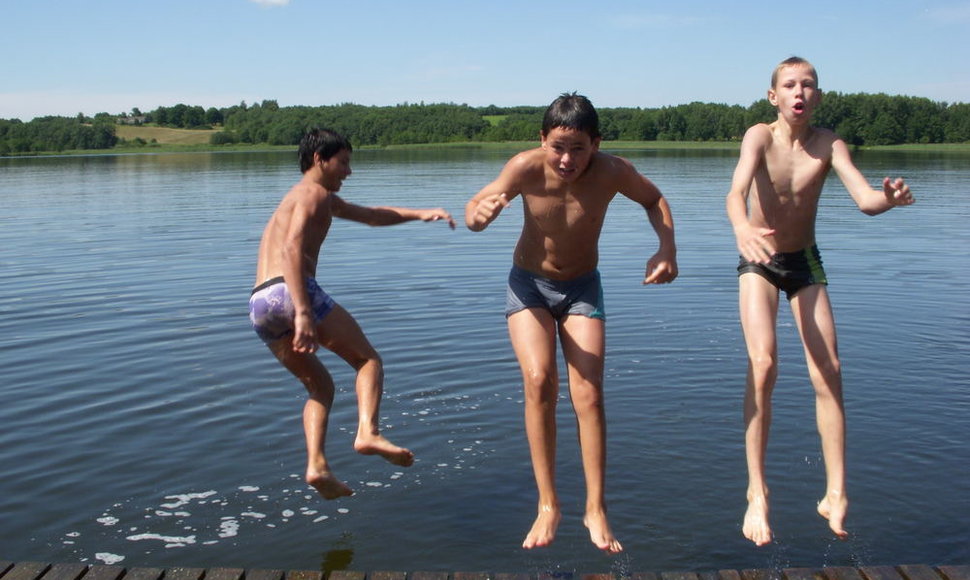That is something beyond the scope of even a statistical Lithuanian family. But can summer fun compensate for absence of parents?
Traditionally, foster home kids receive more attention from the society or the business community before major holidays, particularly Christmas. There is no shortage in December of charity events, TV shows and auctions fundraising for disadvantaged children. Private citizens, too, come to foster homes offering a present or two.
Material gifts are great, but kids who grow without their parents also need personal warmth and communication, social workers say.
15min looks into how the 4,054 Lithuanian kids, currently in the care of the country's foster homes, spend their summer. Does generosity, that spikes in the winter season, melt with snow? Do parentless kids get enough rest and relaxation and summer experience?
June on the coast
“I have to say this: We are a small foster home and we do appreciate any kind of support. Right now, for example, two of our kids are in a military camp, while I'm taking other children to a lake,” says Virginija Violeta Nutautienė, director of Kaunas District Municipal Pagynė Foster Home.
The institution currently takes care of forty 3 to 18-year-old children.
The woman admits that recreational activities of the foster kids much depend on the initiative of the administration, their personal connections and ingenuity: “You always work so that your kids are noticed.” Ms Nutautienė has been running the home for 17 years.
Her foster kids spent 25 days of June on the seaside. One company, Kauno komprojektas, let them use its recreational base.
“We left one employee to watch over the home and moved to the seaside – thanks to the company and its director Antanas Veselka,” Ms Nutautienė does not neglect to mention the name of their benefactor.
She used money raised during TV charity event, “Išsipildymo akcija,” to take and feed children in the camp. “Hiring a bus and transport alone costs us about 3 thousand litas. Luckily, [coach rent company] Kautra offered us a discount,” she says.
Kids from Pagynė Foster Home will also have things to do in August – several entrepreneurs invited them to spend time in “Tarzanija” adventure park. After that, the kids are going to “Trako stovykla” camp in Kaltinėnai.
“I do not want to take my kids to big camps, with children from various foster homes, because they come back with too much of an experience,” the director admits.
Summer with relatives
It is up to foster home administrators to think of something for kids to do during summer. The state budget does not allocate any extra funding for that purpose.
“We are located in a rather unfavourable place – there are no lakes or any other water in vicinity,” regrets Jūratė Pagojienė, director of Panevėžys District Foster Home.
At the moment, her foster kids are spending time in a campsite at the river Virvytė – between the districts of Mažeikiai and Akmenė. The kids have spent here all July and they are going on a trip to the sea in late August. The trips are funded by the Municipality.
“We have sponsors who occasionally invite us for some entertainment. Sure, that usually happens throughout the academic year, not summer, but we do get to go to concerts or a swimming pool. There are talent camps for kids, but those cost more – we could at best send only a few kids there. We own a 42-seat bus, so our principle is that if we go someplace, everyone comes along,” Ms Pagojienė says.
Her institution is currently home to 62 children. Only a tenth of them spend summers with their grandparents or relatives.
Businessmen holiday too
Kostas Rušinskas, social worker at Šiauliai Foster Home, notes similar tendencies. He adds, however, that whenever the home organizes a memorable trip, kids who spend summers with relatives come along too.
“One private fund help us find and rent, for a bargain price, premises in Palanga, so every June, we spend at least ten days at the sea. In addition to that, we go on day trips regularly, as there are nice places around Šiauliai, like Kurtivėnai Regional Park. We're involved in various police prevention programmes, so we take part in volleyball, basketball matches. In August, the kids will spend a week in ethnographic Dargaičiai village,” Mr Kuršinskas lists summer activities.
He says that they receives more offers from businesspeople in spring and autumn. That is when children get to visit the Lithuanian Sea Museum, private zoos: “We get less attention in summer, so we have to do on our own wits. Businessmen are probably also on vacation – other things occupy their minds.”
Candyfloss
Director of Lentvaris Foster Home in Trakai District, Vilma Ramanauskienė, says she does everything in her power to make sure her kids have proper recreation: “I didn't manage it that well last year, but this summer is great. Most of our children are in Lithuanian Children's Fund camp in Palanga, after that they are camping in Šventoji.”
Their schedule includes games, competitions, night-time hikes. “We also have a basketball ground and several days ago, we were painting stones. We're glad we could go to the seaside, that the kids don't spend the summer on concrete,” she says.
The only thing that upsets her is that children cannot afford to taste waffles or candyfloss sold in street stands: “There is no way to justify that kind of expense in the books, while children's allowance does not suffice for sweets. The sums they are given are ridiculous.”
Kids from Lentvaris Foster Home were invited to visit entertainment park “Tanzanija,” but they had to decline it, since Alytus was deemed too far. Instead, they had fun in “TonyResort” park in Anupriškės. Once for free, another time at reduced rates.
“We were also given a discount in Aukštadvaris kartodrome,” Ms Ramanauskienė says proudly. Her institution is in charge of 57 kids.
Egypt or Turkey in spring
Foster homes do not get extra municipal or government funding for children's holidays. These are covered with money from sponsors or 2 percent of income tax that people can donate institutions or NGOs of their choice. Foster homes also save up some money from government grants.
Spike in donations usually occur before Christmas, but these often come from one-off sources. Foster children therefore prefer having permanent sponsoring partners.
“We've been friends with L'Oréal for some years now. The company gives each kid a birthday present and we have a picnic in early June. One private donor has been with us for four years now. He wants to give children things to remember, so every year, he takes 20 of them to Egypt or Turkey. Their suntan stays until summer,” Ms Ramanauskienė grins, adding that this year her kids also went to camp “Merkurijus” in Prienai District.
“Our children also don't stay in the city. We haven't been to the seaside, but we've already holidayed in three summer camps. We went canoeing too. I wish everyone could travel that much,” says Danutė Putrimienė, director of Vilnius 1st Foster Home. The institution houses 60 children.
“My colleagues and I have been talking that children living in an average Lithuanian family don't get as much entertainment during summers as our kids do. But does that make up for the absent motherly or fatherly love?” Ms Ramanauskienė asks.
Indoors only in bad weather
“We have travelled a lot arround Lithuania this year – we went to Vilnius, Molėtai, we're going to Nida tomorrow. Moreover, we've already stayed in three camps. We visited the Cold War Museum, did horse riding,” says Klaipėda Foster Home “Rytas” director Regina Milašienė.
She does not even keep count of day trips to beaches or lakes, cycling tours to Smiltynė: “We don't spend a single day indoors, unless it rains outside.”
Ms Milašienė estimates that summer entertainment for 55 children will have cost about 15 thousand litas. Only a fraction of it is covered by the foster home's own funds, the rest comes from sponsors.
Italian and French families
Director of Alytus Public Foster Home Romutis Žebuolis states frankly: “We are doing fine.” Then elaborates in the language of numbers: of 150 children living in the home, 35 are spending the summer in Italy and France. They won't be back before 2 September.
“This is our joint project with foreign NGOs. The aim is to develop kids' skills of living in families. Children get to see how people live, what their daily routines are, culture. It broadens their horizons, they get some recreation, some even medical care,” says Mr Žebuolis who has been running the home for 26 years.
His charges first went to spend time with French families in summer 1995. Cooperation with Italians started five years ago.
Alytus Public Foster Home will be spending 73 thousand litas this year for summer recreation. “That's a huge sum of money,” the director smiles. “Each municipality gives funding for kids' care, all you need to do is use the funds rationally. And what can be better than summer holidays!”
Each foster kid will have spent 21 summer days near the sea. Besides three scheduled seaside camps, there is one in Vievis and three more just outside Prienai.
“Sure, we have sponsors. This year, 16 kids spent ten days in Burokaraistis near Varėna,” Mr Žebuolis says.
About six months ago, the authorities passed new rules regulating foster kids' temporal stays with private individuals. These, according to Žebuolis, represent both improvements and drawbacks. “Before, we would give out permissions ourselves and were always on edge: can we trust the person? All kinds of things happen, after all... Now they have to sign contracts – the process is longer, but if a person is serious about taking care of a kid, then it should not be a problem,” Žebuolis thinks.
Over 100 foster care institutions
4,054 children live in Lithuania's foster homes and similar institutions. 1,306 are under temporary foster care, while 3,116 – permanent.
Many of the kids, 1,506, are between 10 and 14 years old. The smallest group is that of 4 to 6-year-olds, 382. Infants under 3 number 425; kids between 7 and 9 – 565; 15 to 17-year-olds – 1,129, charges over 18 number 578.
There are 103 foster care institutions in Lithuania: 55 municipal foster homes, 12 municipal foster care groups; 7 public foster homes, 20 private foster homes, 4 social care homes for children with disabilities, 5 infant homes.
In 2011, 47 foster families took care of 371 children. In the beginning of 2010, foster families had 303 charges.













